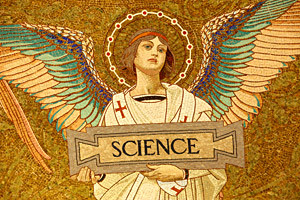 Questions like “Can God make a mountain so big He can’t lift it” are sometimes used as an attempt to discredit the idea of an omnipotent God. They attempt to show that the very idea of some all-powerful entity is logically contradictory and therefore, God doesn’t exist. However, these questions misunderstand both the meaning of omnipotence and the nature of God. Continue reading
Questions like “Can God make a mountain so big He can’t lift it” are sometimes used as an attempt to discredit the idea of an omnipotent God. They attempt to show that the very idea of some all-powerful entity is logically contradictory and therefore, God doesn’t exist. However, these questions misunderstand both the meaning of omnipotence and the nature of God. Continue reading
Author Archives: Scott Dunkley
Aren’t All Religions the Same? (Easter Edition)
As we approach Easter, Christianity’s holiest day, it is natural to wonder if faith in “the risen Christ” represents the only way to have a true relationship with God. In fact, it is increasingly accepted in modern culture that all religions are equally valid or that there is “one god, but many paths.” However, is this premise true? Can other religions provide equally valid ways of knowing God?
To address these questions, we will limit this post to the primary world religions. There are several practical reasons for this limitation. First, it is for simplicity’s sake, given the thousands of religions and philosophies that could be evaluated. Secondly, it is reasonable to assume that if God has revealed Himself, He has done it in an effective way that has attracted many believers. So under this pretext, we will evaluate Christianity, Judaism, Islam, Buddhism, and Hinduism since they are generally considered the world’s most prevalent and influential faiths. Continue reading
The War That Wasn’t
 Many skeptics love to talk about the “war” between Science and Christianity. They characterize Christianity as one of the great evils of the world perpetrating ignorance and superstition while Science is in the noble and relentless pursuit of truth at all costs. Of course, because of Christianity’s vast reach and power, it has persecuted and suppressed Science in an ultimately fruitless attempt to hide its own fallacies. At least that’s how the story goes. Continue reading
Many skeptics love to talk about the “war” between Science and Christianity. They characterize Christianity as one of the great evils of the world perpetrating ignorance and superstition while Science is in the noble and relentless pursuit of truth at all costs. Of course, because of Christianity’s vast reach and power, it has persecuted and suppressed Science in an ultimately fruitless attempt to hide its own fallacies. At least that’s how the story goes. Continue reading
Contradictions (2): Which Women Visited Jesus’ Tomb?
 The gospel accounts of what happened at Jesus’ tomb on Easter Sunday are another favorite target of Bible critics. They point to several inconsistencies in the accounts’ details to illustrate that the gospels are inaccurate and contradictory.
The gospel accounts of what happened at Jesus’ tomb on Easter Sunday are another favorite target of Bible critics. They point to several inconsistencies in the accounts’ details to illustrate that the gospels are inaccurate and contradictory.
In fact, a close reading of the text shows neither inaccuracy nor contradiction. Those who use this as a means of tearing down the text’s credibility do so either because they’re biased and have never actually read the text, or because they are intentionally attempting to deceive others into believing that these accounts are contradictory. Continue reading
Busted (8): The Question of Jesus and the Demoniac
 The story of Jesus and the demoniac, as told in Mark 5, Matthew 8, and Luke 8 is a familiar one in which Jesus encounters a man possessed by a large number of demons. After a brief conversation, Jesus commands the “legion” to leave the man and enter a herd of nearby pigs. These pigs then rush down a steep incline and drown in the sea below.
The story of Jesus and the demoniac, as told in Mark 5, Matthew 8, and Luke 8 is a familiar one in which Jesus encounters a man possessed by a large number of demons. After a brief conversation, Jesus commands the “legion” to leave the man and enter a herd of nearby pigs. These pigs then rush down a steep incline and drown in the sea below.
To Bible critics, this story is a potential gold mine. Across these parallel accounts, they claim, we have both historical error and contradiction that clearly prove the Bible is neither inerrant nor even reliable. Continue reading
Contradictions (1): On Which Day Did Jesus Die?
 Critics point to alleged errors and contradictions in the Bible to show that it is neither inspired nor the work of eyewitnesses. These critics claim that if the biblical writers can’t agree on even the simplest details, how can we possibly believe what they have to say about important spiritual matters? One such charge is that the gospel writers cannot even agree whether Jesus was crucified on the first day of Passover or the day before Passover. Continue reading
Critics point to alleged errors and contradictions in the Bible to show that it is neither inspired nor the work of eyewitnesses. These critics claim that if the biblical writers can’t agree on even the simplest details, how can we possibly believe what they have to say about important spiritual matters? One such charge is that the gospel writers cannot even agree whether Jesus was crucified on the first day of Passover or the day before Passover. Continue reading
Why I Am A Christian
 Like many Christians, I was “born and raised” in the church. There was never a time when we didn’t attend regularly. As I grew up and became exposed to more of the world, I never doubted God’s existence, but I certainly wrestled with questions about whether what I believed was true. Occasional doubts are normal since the topic of God is one that requires some amount of faith. But I have learned over time that faith is not “belief despite the evidence” as some claim. Continue reading
Like many Christians, I was “born and raised” in the church. There was never a time when we didn’t attend regularly. As I grew up and became exposed to more of the world, I never doubted God’s existence, but I certainly wrestled with questions about whether what I believed was true. Occasional doubts are normal since the topic of God is one that requires some amount of faith. But I have learned over time that faith is not “belief despite the evidence” as some claim. Continue reading
Judge Not…
 In previous articles, we discussed how our behaviors and attitudes interact with salvation, and what God expects from us in these areas. We also briefly mentioned how today’s culture doesn’t always accept these values and is quick to call Christians old-fashioned, close minded, or judgmental when they advocate for God’s standards. All too often, some people attempt to silence Christians from espousing biblical ethics by quoting “Judge not, so that you will not be judged” from Matthew 7. Continue reading
In previous articles, we discussed how our behaviors and attitudes interact with salvation, and what God expects from us in these areas. We also briefly mentioned how today’s culture doesn’t always accept these values and is quick to call Christians old-fashioned, close minded, or judgmental when they advocate for God’s standards. All too often, some people attempt to silence Christians from espousing biblical ethics by quoting “Judge not, so that you will not be judged” from Matthew 7. Continue reading
How Should A Christian Act?
 In a previous article, we discussed how works result from, rather than in, a person’s salvation. Now we turn our attention to what those works should be. The Bible states that as Christians, we are Christ’s representatives (2 Corinthians 5:20) and are called to do good works (Ephesians 2:10). The question naturally arises “what should this look like?” Our purpose in this article is to give an overview of how God expects Christians to be and act, as articulated in scripture. This is not an exhaustive analysis, but rather a starting point for self-examination and further study. Continue reading
In a previous article, we discussed how works result from, rather than in, a person’s salvation. Now we turn our attention to what those works should be. The Bible states that as Christians, we are Christ’s representatives (2 Corinthians 5:20) and are called to do good works (Ephesians 2:10). The question naturally arises “what should this look like?” Our purpose in this article is to give an overview of how God expects Christians to be and act, as articulated in scripture. This is not an exhaustive analysis, but rather a starting point for self-examination and further study. Continue reading
Saved by Faith or Works?

The Apostle, Paul, who played a critical role in spreading the Church to the Gentiles during the first century.
The role of faith vs. works in salvation has been the subject of debate and confusion since the beginning of Christianity. Paul clearly states in Ephesians that we “are saved by faith…not by works” while James says that “faith without works is dead.” So which is it? Are we saved by faith, works, or some combination of the two?
The Case for Faith
The Bible is clear that we are saved “by grace through faith” in Christ. But what exactly does that mean? In short, salvation by grace through faith means that we do not earn it through our own actions. It is an unmerited gift from God (i.e. “grace”) given “through faith” in Christ as our personal savior. There are many Bible verses one can cite to explain what “faith in Christ” means, but one of the clearest is Romans 10:9 (“If you confess with your mouth that Jesus is Lord and believe in your heart that God raised Him from the dead, you will be saved.”) Continue reading

